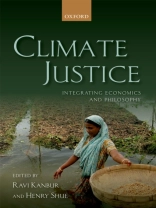Climate justice requires sharing the burdens and benefits of climate change and its resolution equitably and fairly. It brings together justice between generations and justice within generations. In particular it requires that attempts to address justice between generations through various interventions designed to curb greenhouse emissions today do not end up creating injustice in our time by hurting the currently poor and vulnerable. The United Nations Sustainable Development Goals (SDGs) summit in September 2015, and the Conference of Parties (COP) to the Framework Convention on Climate Change in Paris in December 2015, brought climate change and its development impact centre stage in global discussions. In the run up to Paris, Mary Robinson, former President of Ireland and UN Secretary General’s Special Envoy for Climate Change, instituted the Climate Justice Dialogue "to mobilize political will and creative thinking to shape an ambitious and just international climate agreement in 2015". The editors of this volume, an economist and a philosopher, served on the High Level Advisory Committee of the Climate Justice Dialogue. They noted the overlap and mutual enforcement between the economic andphilosophical discourses on climate justice. But they also noted the great need for these strands to come together to support the public and policy discourse. Climate Justice: Integrating Economics and Philosophy is the result. Bringing together contributions from economists and philosophers, Climate Justice illustrates the different approaches, how they overlap and interact, and what they have already learned from each other and might still have to learn.
Ravi Kanbur & Henry Shue
Climate Justice [PDF ebook]
Integrating Economics and Philosophy
Climate Justice [PDF ebook]
Integrating Economics and Philosophy
购买此电子书可免费获赠一本!
语言 英语 ● 格式 PDF ● 网页 288 ● ISBN 9780192542700 ● 编辑 Ravi Kanbur & Henry Shue ● 出版者 OUP Oxford ● 发布时间 2018 ● 下载 3 时 ● 货币 EUR ● ID 7971950 ● 复制保护 Adobe DRM
需要具备DRM功能的电子书阅读器












